Winter storm leads to systemic power, water outages
Drop in temperatures, quality of life causes school cancellation, devastation throughout Texas
February 24, 2021
After a week of extreme winter weather for Texas, many Austin families found themselves dealing with no heat, no power, no water, and no way out in the midst of an uncharacteristic freeze. The 7.9-inch snowfall is now the third most in Austin history, behind only the winters of 1937 and 1984 with 11 and 8.7 inches respectively.
Camping inside is weird, and it’s definitely not ideal to have to put on five layers while in the house, but I’m glad we at least have a roof over our heads.
— senior Gracie Ross
AISD canceled all forms of school during the week of Feb. 15 as well as the following Monday and Tuesday due to widespread lack of power and poor road conditions. All sports and extracurriculars, including the debut week of the spring musical Urinetown, were canceled or postponed.
The Texas infrastructure, built for extreme highs instead of extreme lows, proved inadequate in the well below freezing temperatures. While power sources failed, power demand went up as people tried to rid their homes of the growing cold. The result was some families going days without electricity.
“My family didn’t have power for 47 hours from Monday night at 2 a.m. to Wednesday at 1 a.m,” junior Marios Petropoulos said. “It was very, very cold, but you got used to it.”
Sunday night as a burst of Arctic air swept southward and power plants started to flicker offline.
On Monday morning at 2:14 a.m., many Austin citizens received a texas from the Electric Reliability Council of Texas which read, “Due to record electric demand, Texas electric grid operator is directing rotating outages to protect electric grid reliability. … Outages typically last 40 mins or less.”
But this was no typical power outage or winter storm. Wind, coal, and natural gas generation all fell. Instead of outages of less than an hour, many in Austin and throughout Texas were without power for days.
It’s crazy how much water outages affect the home environment overall. I haven’t showered in three days, and it is absolutely miserable. We could last indefinitely, but our quality of life is rapidly declining.
— junior Grace Hickey
“The very cold weather and snow has impacted every type of generator,” said Dan Woodfin, a senior director of the Energy Reliability Council of Texas told The Statesman.
According to Clifford Krauss, a national energy business correspondent based in Houston for The New York Times, unlike other states, Texas is not linked to the national power grid and cannot use power from other states when its sources fail. Because of this, the plummet in energy production caused a state of emergency to be declared in Travis County and throughout Texas.
“Ours went on and off for a 12-24 hour segment,” freshman Olivia Smith said. “The fact that there was so much snow made it seem like a completely unfamiliar landscape. We couldn’t just turn on a light or play some music. It was so new, and it was creepy because my house was so silent.”
Senior Gracie Ross has a similar experience, going 34 hours without power, 15 with, and then another 30 without.
“We’ve been having to eat dinner with a bunch of candles and headlamps so we can see, and we were making fires to stay warm until we ran out of firewood,” Ross said.
Ross’ mother, Gina Ross, described other ways the family tried to stay warm.
“After we ran out of wood, we bundled up in multiple layers. We also pulled out our camping sleeping bags which are rated for 30 degrees and over, so they kept us pretty warm,” she said.
Gracie agreed that the situation felt strange.
In times like this, it’s easy to get concerned and worried about people you love when you aren’t together.
— junior Anna McClellan
“Camping inside is weird, and it’s definitely not ideal to have to put on five layers while in the house, but I’m glad we at least have a roof over our heads,” she said.
The Rosses were able to bundle up together, but other McCallum families spent the cold nights under different roofs.
“My family ended up split up at three different houses,” junior Anna McClellan said. “Our power went out Sunday night around 1 a.m., and we spent the whole next day debating if we should stay or go.”
Even with icy roads, McClellan’s family made the decision to split up due to spacing issues and COVID concerns at relative’s homes. McClellan’s parents went to stay with her grandparents while she and her sister found friends to host them.
“We ultimately decided we had to go somewhere, even if that meant having to split up for a couple days,” McClellan said. “In times like this, it’s easy to get concerned and worried about people you love when you aren’t together.”
Electricity and heating were not the only utilities that suffered because of the cold. As temperatures dropped, pipes began to freeze and burst causing water shortages across the city. One of those affected was junior Grace Hickey’s home, going almost six days without water.
The Associate Press reported today that the death toll from the winter storm and its effects is nearly 80 people but that the total number killed by the storm and its effects won’t be known for months.
“No water for over 24 hours has made me have to get creative,” Hickey said. “We were lucky enough to fill up the tub with water two nights before the water went out, and we have been using it since.”
Though her family had enough water to survive, sacrifices still had to be made.
“Brushing my teeth with fizzy water and eating instant ramen have been my life for the past few days,” Hickey said. “It’s crazy how much water outages affect the home environment overall. I haven’t showered in three days, and it is absolutely miserable. We could last indefinitely, but our quality of life is rapidly declining.”
For the most unfortunate, the cost of the storm was even worse than that. The Associate Press reported today that the death toll from the winter storm and its effects is nearly 80 people but that the total number killed by the storm and its effects won’t be known for months.
The power outage was compounded by a worsening water situation when a power outage at the Ullrich Water Treatment Plant, Austin’s largest water treatment facility caused drops in water pressures below minimum standards. As a result, the entire city fell under a boil water notice when Austin Water could not process the water to assure its safety. Residents were advised to boil water beginning on Wednesday night and to conserve water so the city could regain enough pressure to resume supplying water safely to the whole city.
The boil water ban was lifted for the whole city today.
To donate resources, visit the following locations:
Sims Elementary School, 1203 Springdale Road, 78723
For: any type of food, water, feminine hygiene products, blankets, baby food, formula and diapers, toiletries, socks and personal protective equipment (i.e. masks, hand sanitizer, etc)
Drop of is any time between 12 to 6 p.m. Monday through Wednesday of this week.
Burnet Middle School, 8401 Hathaway Drive, 78757
For: canned food, bread, pasta, produce and water.
Email Yuri Trevino at [email protected] if you plan to drop off.
To pick up resources, contact the Austin Disaster Relief Network.
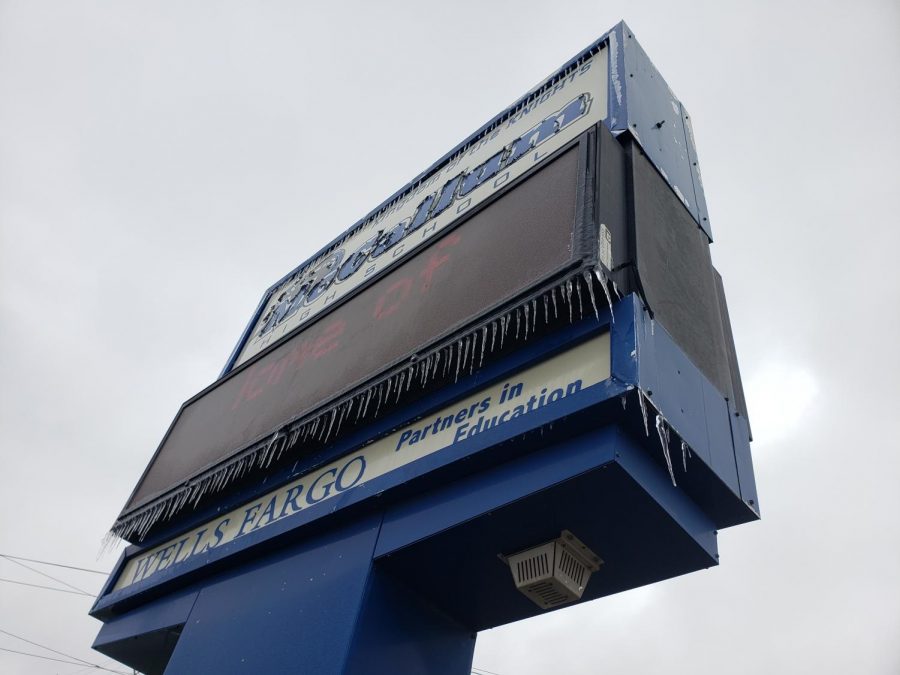
Before the snowstorm came to Austin, icicles formed in unusual places as rain froze before it could fall as revealed in this picture of the marquee outside the McCallum Arts Center on Saturday, Feb. 13. Photo by Dave Winter.

Junior Carly Johnson went exploring with her day on Monday morning to see how Austin was coping with the record snowfall and discovered at least three skiers turning Congress Avenue into a cross-country ski venue. “It was really funny to see skis out in Austin because obviously that doesn’t happen daily,” Johnson said. Photo by Carly Johnson.

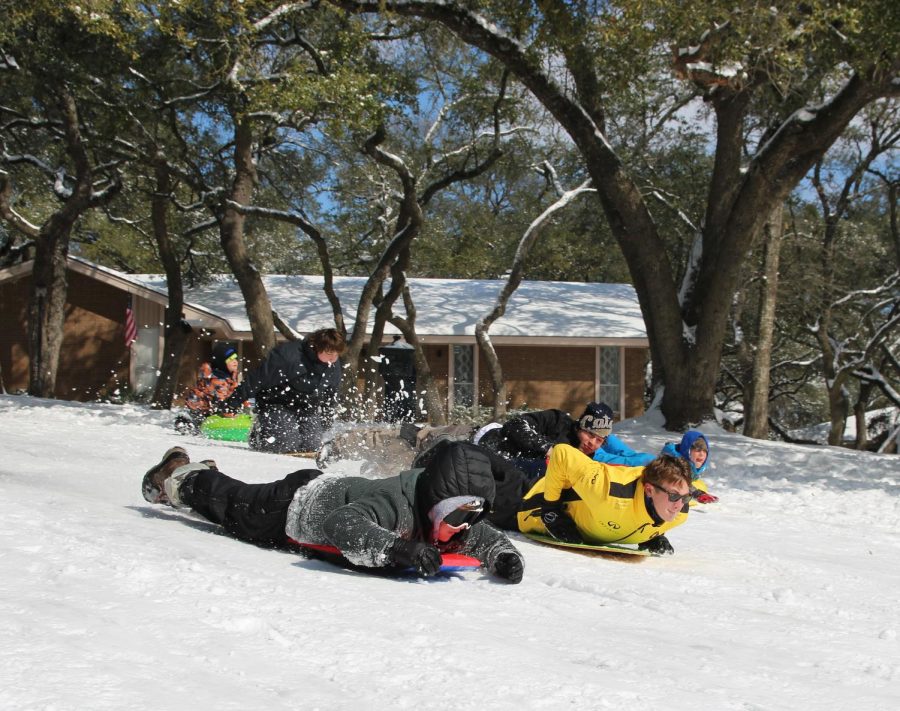
At least for a while on Monday, the attention of Austinites was on enjoying a second major snowfall of 2021. These north Austin teens found an ideal sled run in their neighborhood and took full advantage of it, using whatever beach flotation device or surfboard they could scrounge up and repurpose for the occasion. Photo by Dave Winter.

Junior Ivonne Villareal uses the early days of SNOVID for some relaxed meditation. The picture embodies the mental gymnastics that a lot of Austinites underwent trying to balance the fun of rare snow in Austin with the harsh realities inflicted by power outages, frozen pipes and being without potable water. Photo by Ruth Villareal.

Senior O’Mari Hill ventured out on Monday for his second sojourn in the snow in as many 2021 months. “I was just enjoying how much it actually snowed it Texas,” Hill said. Photo courtesy of Hill.
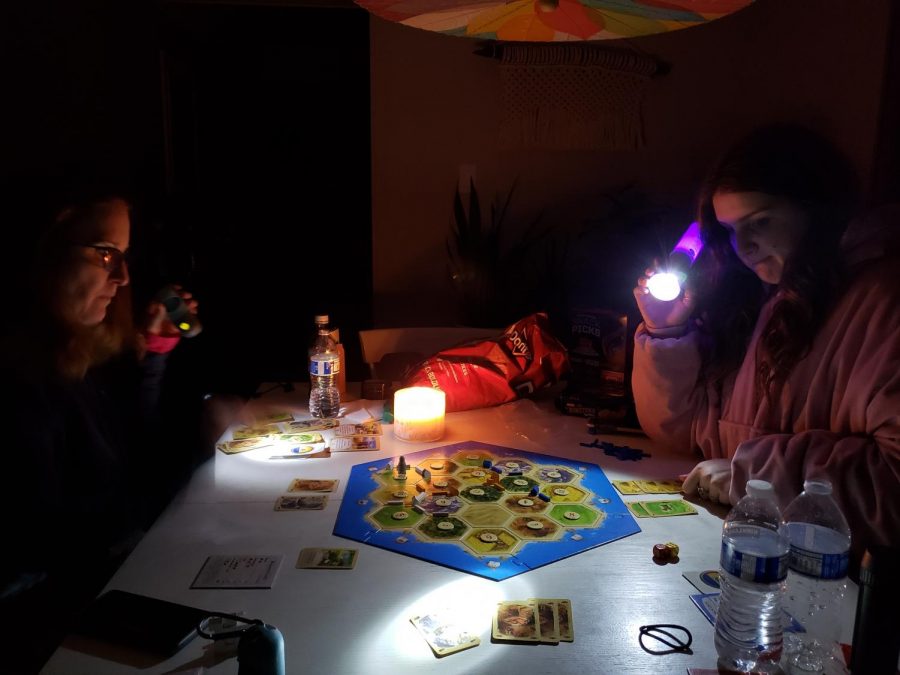
Junior Annabel Winter plays the board game Catan with her parents in their powerless house on Monday night. Like many families in Austin, the Winters lost power around 2 a.m. Monday morning and didn’t have their power restored until three days later on Wednesday afternoon around 5 p.m. “It was a surreal experience,” Winter said. “It felt kind of apocalyptic because we were holding flashlights and were all bundled up in blankets, kind of like a dystopian novel.” Photo by Dave Winter.
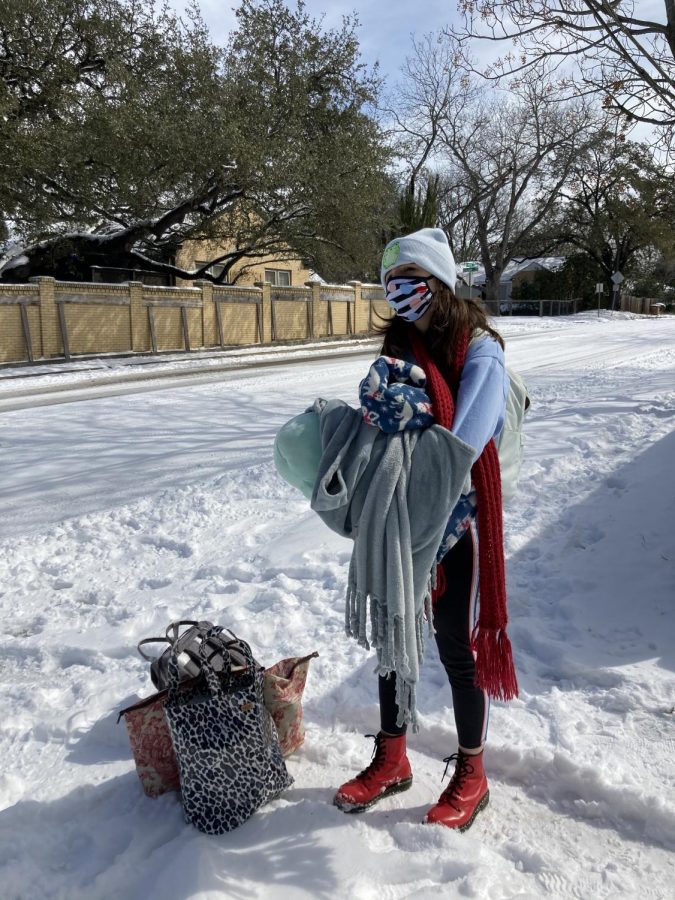
Senior Gracie Ross and her mother wait in the snow to be picked up and taken back home after seeking refuge at a friend’s house. Like many families, the Rosses lost power for over 60 hours and found themselves forced to become snomads, leaving their home after running out of firewood. “We’ve been very lucky to have wonderful friends who have helped us so much,” Ross’ mother, Gina, said. “It’s tricky with COVID on top of the storm issues, but luckily we were able to stay one night with friends who have a guest house.” Photo courtesy of Gina Ross.
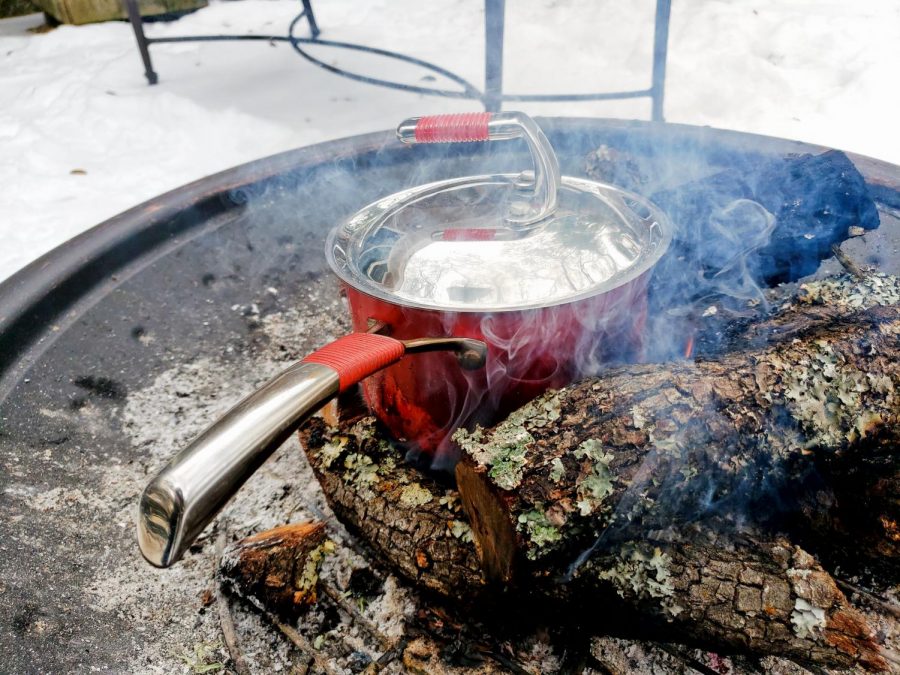
Coming to a city that was already suffering a widespread loss of power, the boil water notice presented a real dilemma as people either had no water to boil or no electricity to boil water if they did have it. One family devised this solution. Boil water in an outdoor fire pit. The fire pit also provided heat to warm leftover pizza, smoked sausage, chicken noodle soup, chicken nuggets and, as a last resort, cheese enchiladas. Photo by Dave Winter.
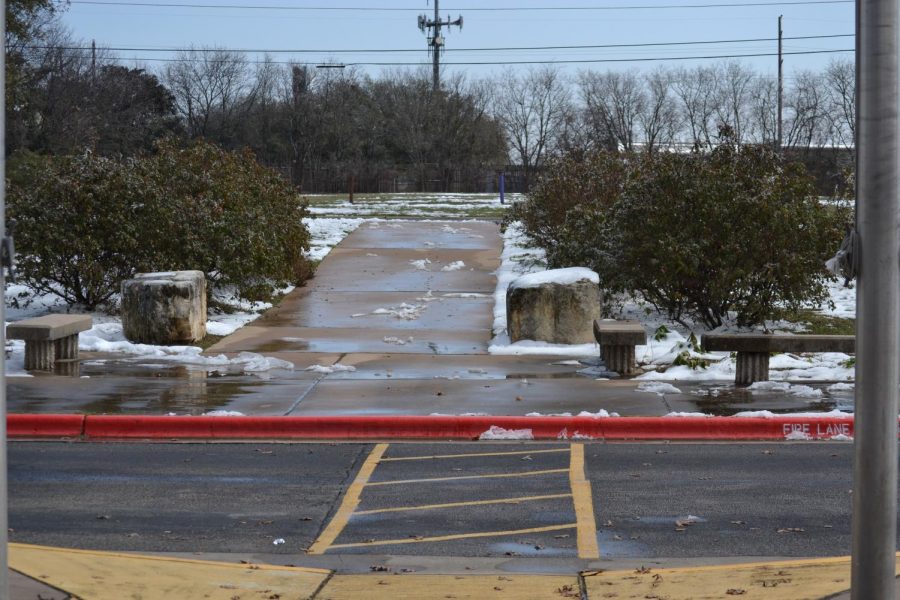
The path to the front entrance of McCallum on Thursday afternoon with remnants of snow visible from the week prior. Icy road conditions made accessing the school or any other building extremely dangerous, leading to cancellation of all in-person activities. Photo by Ellen Fox.
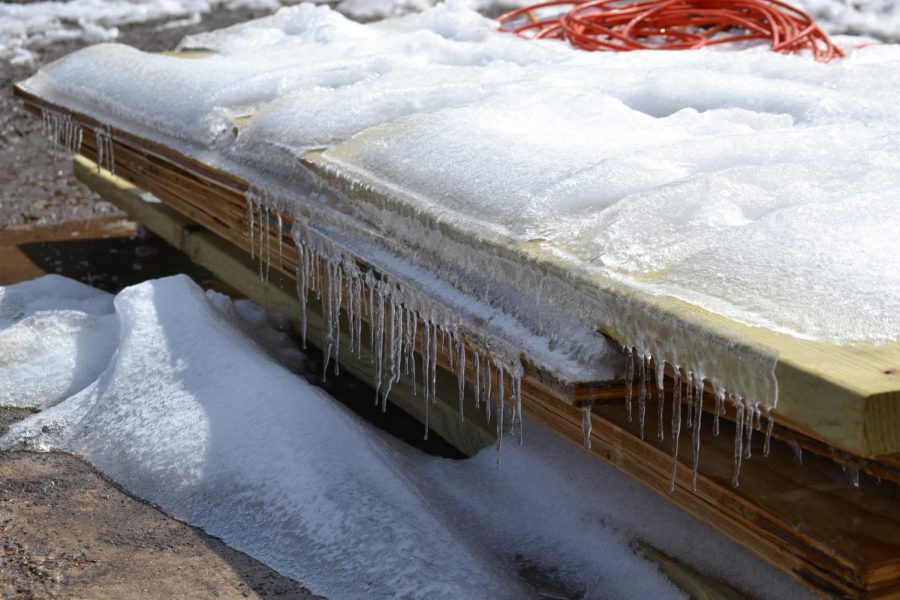
Icicles and snow cover the corners of the building site of the outdoor stage. The winter storm caused the first weekend run of Urinetown, the school musical, to be canceled. Urinetown will resume rehearsals this week and will now debut March 4. Photo by Ellen Fox.
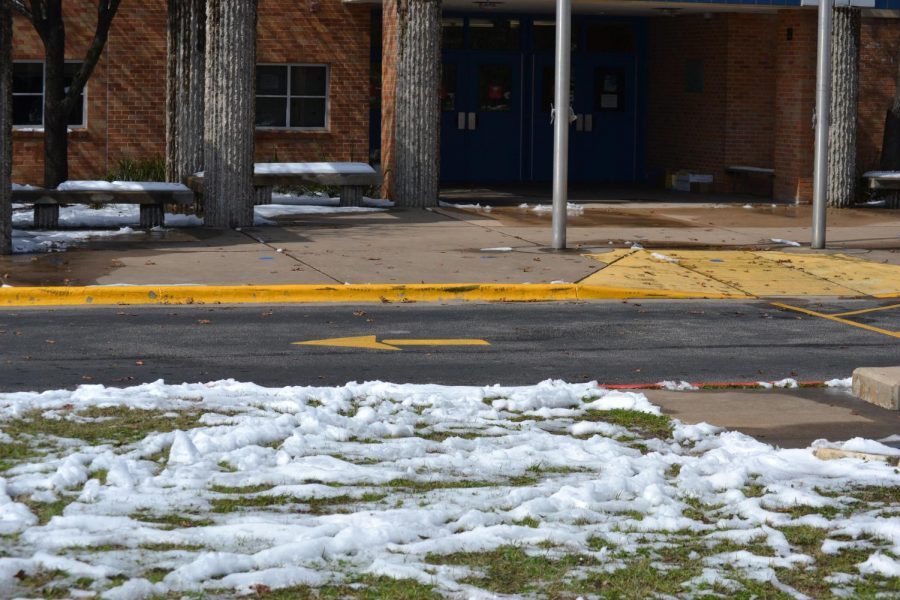
As the snow and ice melted, the entrance to McCallum started to look a little more recognizable. Photo by Ellen Fox.
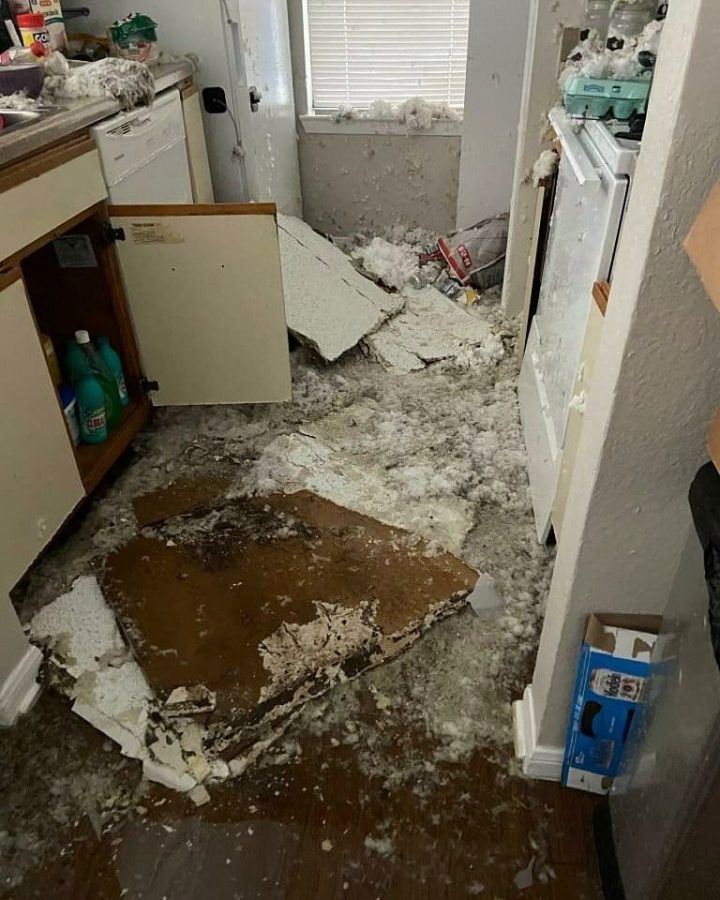
This past week, the Soliz-Washington family, which includes McCallum alums Andrew (Class of 2020), Aaron (Class of 2017), and Ariel (Class of 2015) and current junior Adrianna, were strongly impacted by the winter storms. Due to bursting pipes, their house was flooded, leading to the collapse of their ceiling. “One day we woke up to the dogs barking profusely at the ceiling, and as I ran, slipping and falling to the front room, our kitchen collapsed,” Aaron stated in the GoFundMe fundraiser page created to help the family recover. Though everyone in the family has safe places to stay, there are still lots of repairs to be made to their currently uninhabitable home. Aaron wrote that he’s unsure how much the repairs will be, but they will hopefully have “something to come back to once this is all said and done. … We don’t have much, but what we do have we’re trying to keep and grow with.” To make a donation to the GoFundMe account in support of the Soliz-Washington family, please click this link. Photo courtesy of the Soliz-Washington family.
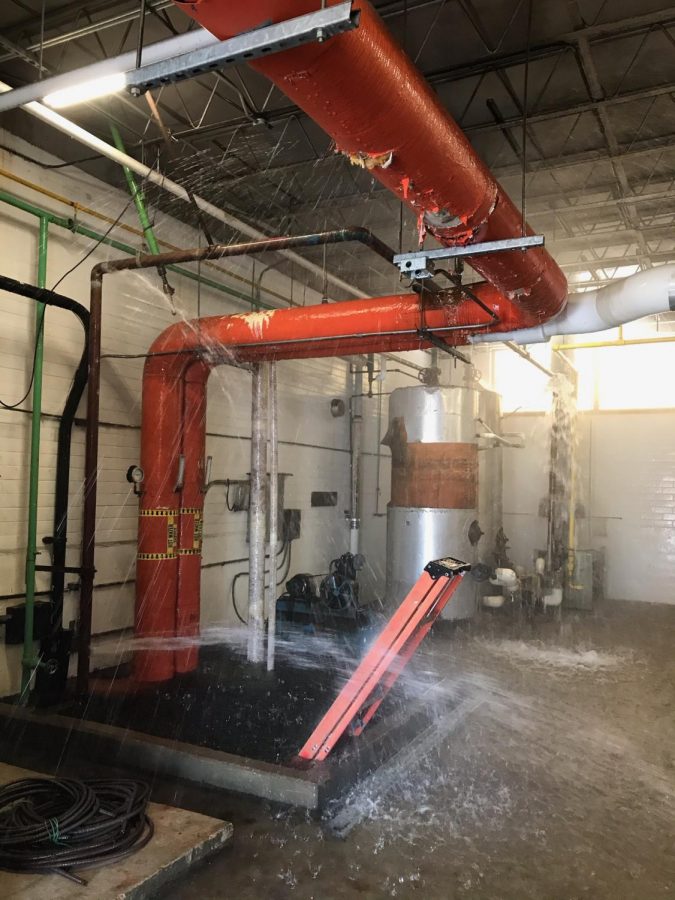
The deep freeze led to multiple burst pipes in the boiler room, which is directly behind the band hall. Once the frozen pipes thawed out, the flood was inevitable. Coach Thomas Gammerdinger captured this image on Friday. He also witnessed a few leaks in the math hall, but said that the boiler room leaks were by far the worst leaks that he saw on campus on Friday. Photo by Gammerdinger.

This picture of the meat aisle at the North Hills H-E-B on Saturday morning suggest how desperate Austinites were for fresh food after a power outage of several days left many citizens without food to eat. With many restaurants closed, the grocery stores were temporarily overwhelmed with demand for certain food items. Photo by Dave Winter.

When the temperatures rose and frozen pipes starting bursting all over the city, plumbers became the most essential of essential works. Many Austin plumbers reported that they were booked for days, weeks even. The arrival of a plumber in a driveway like this one made families the envy of their neighbors. The plumber who arrived in this Peanut Plumbing van said that he was routinely approached by neighbors at every stop he made on Friday, Saturday and Sunday. Peanut Plumbing prioritized its customers into distinct phases. Phase I was to help any customer who needed to have water restored. Photo by Dave Winter.
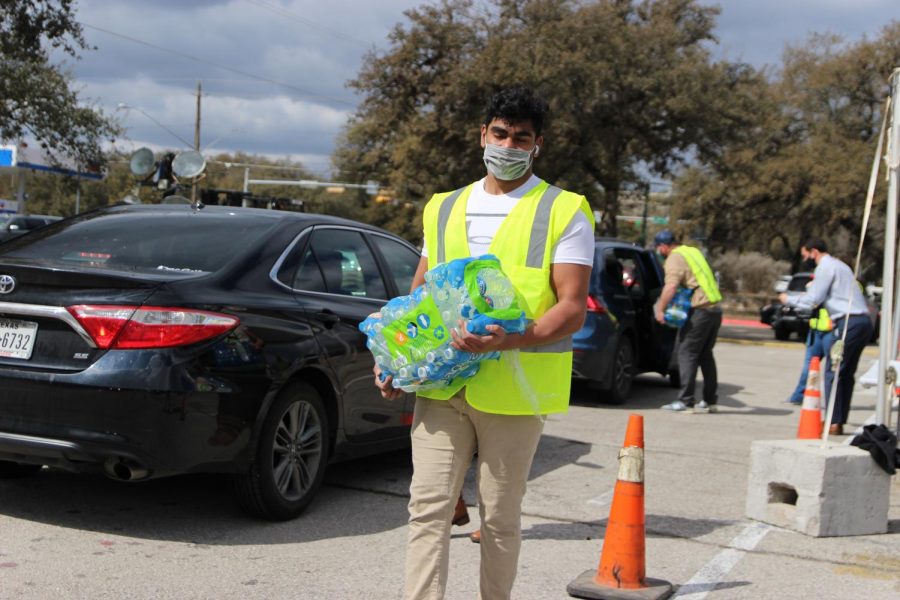
Volunteers deliver the last cases of the first shipment of about 600 cases of bottled water this morning at the City of Austin water distribution site at Anderson High School. According to District 10 City Council member Alison Alter’s Facebook page, a second shipment came at 12:20 p.m. and a third shipment at 4 p.m. By 5 p.m. Sunday, the City of Austin reported on its website that it had delivered 69,216 cases of water throughout the community in three phases: 17,136 to Phase I sites (critical facilities, shelters), 14,448 to Phase II sites (vulnerable populations) and 19,068 to Phase III sites (general population). Photo by Dave Winter.

The food shortage in the city caused by multiple-day power outage gave way to a water shortage after the Austin Water announced a citywide boil water notice on Wednesday night following a power outage at the Ullrich Water Treatment Plant, Austin’s largest water treatment facility caused drops in water pressures below minimum standards. By Sunday, the bottled water aisle at the Far West H-E-B was picked clean by customers. There wasn’t a single bottle of purified water in the store, only a small number of boxes of water. Photo by Dave Winter.












![With the AISD rank and GPA discrepancies, some students had significant changes to their stats. College and career counselor Camille Nix worked with students to appeal their college decisions if they got rejected from schools depending on their previous stats before getting updated. Students worked with Nix to update schools on their new stats in order to fully get their appropriate decisions. “Those who already were accepted [won’t be affected], but it could factor in if a student appeals their initial decision,” Principal Andy Baxa said.](https://macshieldonline.com/wp-content/uploads/2024/04/53674616658_18d367e00f_o-600x338.jpg)
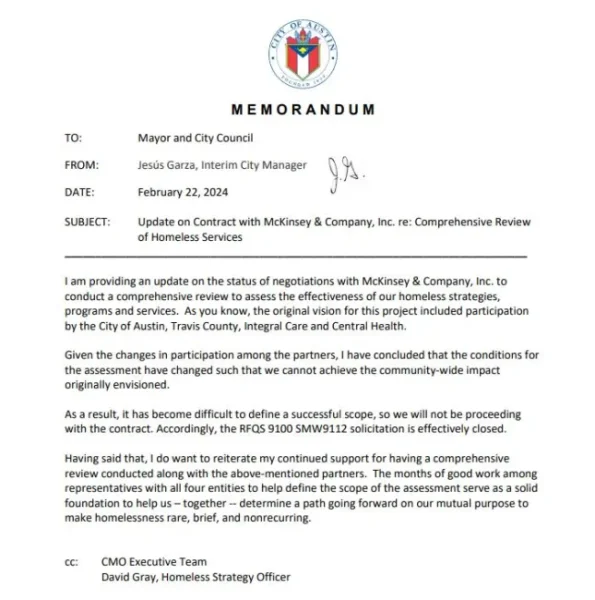


Jaella Brush • Mar 11, 2021 at 10:41 am
This article was a good representation of what happened in Texas during the winter storm. The story was interesting and informative and the lede made me want to read more. The photographs were well shot and helped bring the story to life. I liked how there were many different point of views of what happened to different families all over Austin.
Paris Haslanger • Mar 3, 2021 at 12:00 pm
The title, lede, and photographs were all super captivating and really intrigued me to read further. Out of all articles I read on the winter storm this was the most emotional and personal to read. I think this story really captured just about everything that happened the week of the snowstorm, even though there were so many crazy things going on. The most interesting section in your story was the section about the Soliz-Washington family, it was the part that really made it personal and emotional. I really enjoyed this article.